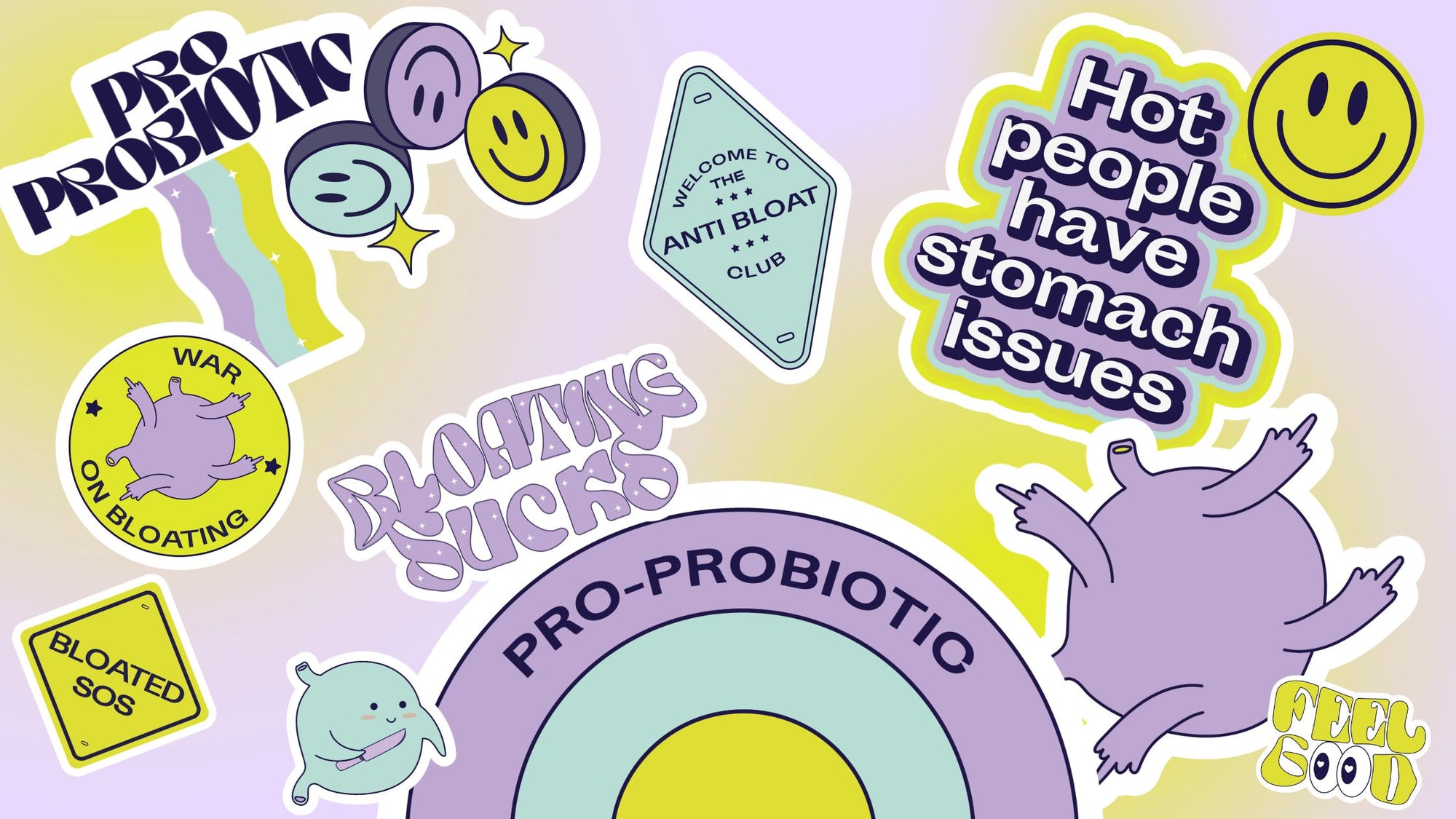Constipation is something that we all deal with from time to time, and there are many causes of it. This regular digestive issue can be a result of something as simple as eating different foods or travelling, or it can be due to a more serious cause, such as a chronic digestive health issue like irritable bowel syndrome.
Thankfully, there are certain foods that can help with natural relief of constipation and promote a bowel movement. These foods have natural laxative effects and are handy to include in your diet to ensure regularity.
In this article, we are going to cover some of the most effective constipation-relieving foods that you can add to your diet if you’re struggling with toilet regularity. We will also give you some additional tips for relieving constipation at the end of the article. First, let’s cover what constipation is and its main symptoms.
What is Constipation?
Constipation is a common digestive symptom that is associated with a feeling of fullness and bloating in the abdomen. It can range from mild to severe.
Technically, to be constipated, you need to experience a decrease in your usual bowel habits. So, if you usually have a bowel movement every day and this suddenly decreases to just two or three times a week, you may be constipated.
However, if you normally only go to the toilet a few times a week, this doesn’t mean you’re constantly constipated. It’s just your ‘normal’. If you are reduced to having just one bowel movement a week or nine at all for a few weeks in a row, you are constipated.
You can get constipated because you have eaten too much, changed your diet (especially if your diet now contains less fibre and more salt or saturated fats), or been travelling more than usual. Constipation is also a common complaint amongst pregnant women or menopausal women due to the drastic changes in hormones during these key milestones in a woman’s life.
Many people also find that they get constipated when they feel more stressed than usual, whether this stress is related to work, finances, or relationships.
What Are the Symptoms of Constipation?
Constipation is associated with a feeling of fullness, tightness, and bloating in the abdomen. It’s often accompanied by abdominal cramps and pains, and many people find that they feel more lethargic and sluggish when they’re constipated.
You might find that your appetite reduces when you are experiencing constipation because you feel full and binged up all the time. All of these symptoms, however, should subside when you eventually go to the toilet, whether you took a synthetic laxative or used some of the tips below to do so.
What Foods Can Help to Prevent Constipation?
A few simple changes to your diet can do the trick in relieving constipation and any associated bloating. Certain foods have a natural laxative effect and can be a natural remedy for constipation and digestive symptoms.
So, which foods can be effective in relieving constipation? Let’s take a look!
Prunes
Prunes are a well-known food for relieving constipation. They contain high amounts of fibre, both soluble and insoluble, which promotes more efficient digestion and gets things moving down below.
Although soluble fibre slows digestion down, which most would think can worsen constipation, it can actually help with bowel regularity. It also slows down glucose absorption into the bloodstream, preventing large spikes in blood sugar levels and helping you feel fuller for longer.
Insoluble fibre softens the stool and makes it easier to pass through the large intestines. Fibre also fuels the probiotic bacteria in your gut, which further promotes great digestive health.
Prunes contain a natural sugar alcohol called sorbitol, which is known to have a mild laxative effect. Sorbitol causes water to move into the lumen of the intestines, softening the stool and preventing it from becoming dry and hard to pass.
Apples
If you’re a fruit lover, apples are a great choice if you’re constipated. They are packed full of fibre, especially if you eat them with the skin still on, with an average sized apple containing over four grams of fibre.
More specifically, apples contain pectin, a type of soluble prebiotic fibre that the probiotic bacteria in the gut can break down and use for fuel. Probiotic bacteria help with digestive processes, including metabolism and nutrient absorption, so keeping them happy is key for avoiding or eliminating constipation.
Pears
Pears are also high in fibre. We won’t go into the details about why fibre helps to prevent or relieve constipation again, as we have just gone through this! This yummy green fruit is also high in sorbitol, which we have also discussed.
Fruit lovers should consider chopping up some apples and pears as part of a deliciously refreshing fruit salad when you’re experiencing constipation on holiday or at home for some much-needed relief.
Berries
Strawberries, raspberries, and blueberries are high-fibre fruits that are easy to add to your diet. They taste great in smoothies and cereal, adding fibre, vitamins, minerals, and antioxidants to your dishes. They also have a high water content, hydrating the body and keeping the stool soft to prevent constipation.
Leafy greens
Vegetables like broccoli, spinach, kale, and Swiss chard are high in water, fibre, and magnesium, a mineral that promotes relaxation of the muscles into the large intestines. Relaxation of these muscles can make it easier to have a bowel movement.
Although they might not be as enjoyable as fruits to some of you, try including more leafy greens in your diet. Use them in stir fry dishes, make a vegetable lasagne, add them as a side dish to your meat and potatoes, or mix them into a healthy green smoothie.
Chia seeds and flaxseeds
Both chia seeds and flaxseeds are packed full of fibre, helping to bulk up the stool and stimulate peristalsis, which refers to the involuntary contractions of the smooth muscles within the intestinal wall that help to push food through the digestive tract and out of the body.
Seeds are high in unsaturated fatty acids that can have anti-inflammatory effects on the body. Inflammation is a known contributor to digestive issues, so eating foods that minimise inflammation is essential to keeping constipation at bay.
Consider sprinkling chia seeds and flaxseeds on top of yoghurt, oatmeal, or acai bowls, or stir them into your smoothies for added fibre and bloat relief.
Oats
Oats are high in a type of soluble fibre called beta-glucan, which acts as a natural laxative. Beta-glucan can add bulk to the stool, stimulating smooth muscle contractions in the bowel.
You can do all sorts with oats. Mix them with milk and pop them in the microwave for a hit bowl of oatmeal (on top of which you can add lots of fruits and seeds for extra fibre and nutrition). You can blend them with fruits, vegetables, and nut butter for a smooth and satiating smoothie. If you enjoy baking, switch traditional flour for oats in your recipes when making cookies, cakes, and biscuits.
Beans and legumes
Beans (all kinds of beans like kidney, pinto, edamame, and black beans) and legumes (like chickpeas and peanuts) are high in insoluble fibre that promotes great toilet regularity and supports the growth of beneficial probiotic bacteria in the colon.
Probiotic bacteria, which include Lactobacillus and Bifidobacterium, support healthy digestion and provide natural constipation relief. Keeping these gut bacteria happy is key to avoiding digestive issues and managing pre-existing chronic digestive disorders.
Whole grains
Wholemeal bread, brown rice, and whole wheat pasta have lots of insoluble fibre, which softens the stool and makes it easier to pass. Adding whole grains to your diet is easy. Simply swap white bread for wholemeal bread, white rice for brown rice, and white pasta for whole wheat or legume-based alternatives, such as chickpea or black bean pasta.
Yogurt and fermented foods
Fermented foods are abundant in probiotic bacteria, which support the probiotics that reside naturally in your gut and boost their numbers. With a healthy and flourishing gut microbiome, your digestion will function optimally and you’re much less prone to experiencing constipation.
What Are Some Daily Habits to Relieve Constipation?
Alongside adding the above foods to your diet, there are other non-dietary things that you can do each day to promote bowel regularity and provide constipation relief. Practising these habits every day can help you avoid constipation altogether, and preventing a symptom is always better than treating it after it has appeared!
Below are some helpful strategies, natural remedies, and daily habits that will help to eliminate constipation and keep your bowels happy.
Keep yourself hydrated
Staying hydrated is essential for healthy digestion. Adequate hydration prevents the stool from becoming dry and painful to pass.
Drink at least two litres of water a day, and ideally a little more if you’re quite active or it’s a particularly hot and humid day where you’re sweating more than usual. Keep a filled water bottle by your side everywhere you go so you can take regular sips throughout the day and avoid thirst, dehydration, and constipation.
You can also consume lots of water-rich foods such as cucumbers, melons, oranges, soups, and broths to stay hydrated.
Get your body moving
Exercise is essential for great health and fitness. It’s also vital for keeping a healthy and well-functioning digestive system.
The physical movement of your body during exercise gets things moving through your lower digestive tract and can stimulate smooth muscle contractions, promoting a bowel movement. Think of exercise as nature’s laxative!
Incorporate between 20 and 30 minutes of moderately intense exercise into your daily routine, totalling 150 minutes of physical activity a week.
Your 150 minutes of exercise can be split however you like, and it can include a variety of activities, such as walking, jogging, cycling, swimming, dancing, or yoga. Focus on the forms of exercise that you enjoy the most so you’re more likely to stick to a routine and stay motivated to continue exercising.
Add a probiotic supplement to your diet or consume more probiotic-rich foods
Probiotics are species of bacteria that are beneficial for maintaining healthy digestion. They help to metabolise the foods you ingest, produce vitamins (B12 and K, to be precise), and prevent pathogenic (harmful) microorganisms from entering the bloodstream through the intestinal wall.
As they support your digestion, consuming probiotics in your diet can help to relieve constipation, even if you’re prone to experiencing it. Add a probiotic supplement to your daily routine, such as our A Dose For Bloating supplement, which contains two billion probiotic bacteria.
Taking one or two capsules of A Dose For Bloating each day can get rid of constipation and bloating, and promote bowel regularity without you needing to change your diet or cut out the foods you love.
If you don’t mind changing a few things in your diet, consider adding probiotic-rich foods to your diet. Fermented foods like yoghurt, kefir, tempeh, tofu, sauerkraut, and miso are great options to boost your probiotic consumption.
Minimise your stress as much as possible
Stress can cause constipation due to the direct connection between the brain and the gut, which is rightfully named the gut-brain axis. This connection means that your thoughts can impact your digestion and vice versa.
When you’re stressed, your digestive system can become more sensitive to the foods and nutrients you usually consume. In turn, you’re more likely to experience bloating, constipation, and other digestive symptoms.
Practicing stress-lowering activities each day can keep constipation to a minimum and support better digestive health. Stress management can include gentle exercise, journalling, yoga, and meditation. Even just 10 minutes of these activities can be enough to relieve stress and avoid bowel blockages.
It’s not always easy to reduce your stress. Work and family matters can take priority over your health and well-being at various times in your life, and there may be nothing you can do about this. However, taking action to reduce your stress wherever possible can help support your digestive system and allow your gut microbiome to thrive.









